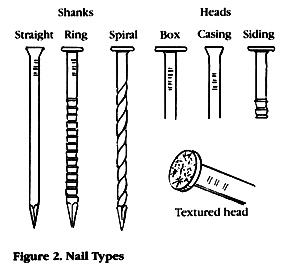63 Types Of Nails Hardware
Box nail - like a common nail but with a thinner shank and head Brads are small thin tapered nails with a lip or projection to one side rather than a full head or a small finish nail. To make it easy for you weve compiled the data below as a guide for figuring out what each fastener is called.
Have different designs for fastening to different materials.

Types of nails hardware. There are two types of stainless steel fasteners available 304 and 316. Semi-permanent Fasteners joint can be categorised into three parts which as follows 1. Scroll down to learn about many different types of nuts bolts and screws.
Knurled or Fluted Shank. Aluminum nails - Made of aluminum in many shapes and sizes for use with aluminum architectural metals. Nails and screws that are for use outdoors must be able to withstand rain snow heat and cold.
Ring shank ardox or to serve special purposes paneling nails drywall nails. Cotter Pins Cotter or split pins have two tines which are bent apart to hold them in place. Nails are typically driven into the workpiece by a hammer or pneumatic nail gun.
The shanks of the nails can have different treatment to increase holding power eg. Semi-permanent Fasteners All fastening methods in which fastening may get damaged but not the job. Nails have their own classification system ranging from 2D to 60D.
Drywall nails are designed for easy concealment and reduced slippage. Feature a second head along the shaft to allow for easy removal from temporary construction such as concrete forms or scaffolding. Consisting of a vertical thread to make it strong this type of nail can be used in masonry and cinder blocks to prevent cracking.
A nail holds materials together by friction in the axial direction and shear strength laterally. The d stands for denarius a Roman pennya reference to how much they once cost. Other types of nails include pins tacks brads spikes and cleats.
Finishing nails are for more detailed work and have a small flat head designed to blend in with project finishes such as those on crown molding. The head has fins underneath that prevent the bolt from spinning during installation. The basic design of a nail hasnt changed much over all that time with a smooth shank and a larger head though nails today are typically made with steel often stainless steel.
Tools. 11 Nails Every DIYer Should Know Different projects demand different types of nails. These are some of the most popular types of nails.
The most common is a wire nail. Box nails offer easier driving with a steel construction and diamond-point tip. 316 should be used in moist and humid climates while 304 works best in dry climates.
Fasteners come in many different forms. Machine threaded fasteners with a wide domed head. Framing nails These versatile nails can be used for building walls or roofs laying sub-flooring and virtually anywhere else construction lumber is needed.
Hex Flange A hex head with built in flange. Find nails at Lowes today. These provide a lot of versatility for dozens of jobs which is why they are the most common type of nail.
According to the key fitting it is of two types sunk and saddle key. Nails are designed to resist both pullout and shear with shear strength determined mainly by the shank diameter and pullout strength affected by that and the shanks design. This is used whenever a little chance to re-open the joints.
Stainless steel and aluminum fasteners repel rust and last for long periods of time. Brad nails can easily blend into wood trim. Common nails and finish nails etc can come in many different coating to increase holding power or to prevent discoloration of the wood or to resist rusting.
Types of nail include. Underlayment nails have rings on the. A variety of nail types exist.
These are used most for soft- to medium-density woods. For instance installing trim and molding calls for finishing nails. Screw helical nail a nail with a spiral shank.
Typically used in wood. Types of Nails Nails unlike screws have smooth shafts and are designed to be fastened with hammers. Nail types.
Roofing clout nail generally a short nail with a broad head used with asphalt shingles felt paper or the like. Ring annular improved jagged shank nail nails that have ridges circling the shank to provide extra resistance to pulling out. Slotted Hex Washer A hex head with built in.

